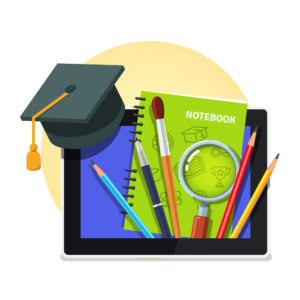Learning or improving French or any other language can be extremely demanding. Have you ever been worried about going to group classes and be completely lost? Or finding a suitable tutor for you? Not knowing which book to buy to start with ? How to make a program to follow? Wondering what are the best resources to learn French?
Surely, with our daily lives it is not always possible to devote yourself to learn a language.. It takes a lot of time and money! It can even sound impossible. However, this should not mean that you should give up on your will, on your dream to learn French.
But, you might ask “how?”. How can you juggle everything?
In this blog, I will talk about learning French online. I will guide you towards some resources to learn French such as apps, podcasts, websites I find particularly good and helpful. Along that, I will teach you some practical ways you can have to learn French.
First of all, why learning online is the best option for you?
Just take a moment and imagine yourself peacefully in your pyjamas on your sofa with a cup of coffee learning french from the comfort of your own home, at your own pace. This sounds way better than rushing to go to a group class, learning a bunch of boring and complex grammar rules with some strangers and trying to practice French with them without even knowing if you’re making any progress!
Learning French online would not only make your life easier and stop you from running around to be here and there, trying to squeeze everything in, it would also provide a familiar and reassuring environment.
In these conditions, you would feel much more relaxed and mentally more ready to learn. Your brain would memorise information so much better and quicker if you simply feel mellow rather than stressed out!
A peaceful mind maximises your learning capacities. Moreover, to learn French online from home would make you a self-directed learner.
I know, when it comes to learning a language, a lot of people prefer to have a structured program, they prefer to let the tutor be in charge of that. Probably, because they’re scared of taking control of their own learning which can be understandable. As I said, with this blog you’re going to learn some new ways which will make you take responsibilities of your own learning and be in charge of your learning program.
So, how can you do this, then? Where should you start?
Internet. It is a wonderful source of information which contains so many useful and interesting resources to learn French. So many though, that’s often the problem. You could easily get lost in the amount of information available on the web. So, let’s start with the first step!
I) Learn French with these 3 apps
We use a bunch of apps for anything today. To get food, to buy new things, to chat, to plan, to get around, for social media and the list goes on and on. So, why not adding few apps to learn French?
What are the benefits of studying French with apps?
Well, first of all, you can learn whenever you want and wherever you want!
Going to work or to school using public transport take a lot of time. So why not spending that time learning few words in French?
Whether you’re a complete beginner or an intermediate/advanced level, one of the most important thing you need in French or any other language, is vocabulary!
I keep repeating this to my students but without vocabulary you won’t be able to speak. Even if you know all the tenses, all the grammar rules, if you don’t have the right vocabulary, you won’t be able to express yourself.
-
Duolingo
Duolingo is probably one of the most well-known language learning app in the market. It was the winner of both Apple’s App of the year in 2013 and Google Play’s Best of the Best awards again in 2013.
In summary, I think Duolingo really excels in simplifying. Even the design speaks for itself; with a cute green bird as its mascot and a clean, minimalist theme, it’s certainly easy on the eyes!
With Duolingo you can learn adjectives, question words, tenses, abstract nouns, technical terms and a lot more vocabulary!
There are about 60 units in total for Duolingo French, inside every unit, there are subunits where you can learn seven new words. It does this through a combination of fun exercises such as rearranging sentences, matching a picture to the word, and repeating a phrase in French to be assessed. There are only about 20 of these questions per unit, so you can get through it pretty quickly.
I highly recommend this app for beginners! If you study 20 minutes a day on Duolingo you can probably finish all the units in about three months. That’s 1500 words in three months! Note that to be “proficient” in French you need about 5,000 words in your active memory. So, learning with duolingo sounds like a great start!
-
Mosalingua
Another great app where you can learn vocabulary and a lot more! Even though, to get this app you have pay about 5€, I think it’s very beneficial in every way.
MosaLingua is a platform that’s a good blend between an interactive French app and an audio phrasebook.
What makes MosaLingua unique is its use of the SRS technique when presenting new words. Basically, SRS is a way to calculate when words should be presented for you to revise just before they’re about to be forgotten. That way, in the long term, words you learn will stick with you a lot longer.
With over 14 categories and 100 sub-categories, all with conversations and audio files to boot, and covering over 3000 phrases in its audio phrasebook, MosaLingua is designed to help you absorb all this material (and keep it!) in the shortest possible time.
For an app that has received largely positive ratings for its iOS French app and its Android French app, Mosalingua French is a great course to check out. I recommend it for complete beginners to intermediate levels!
-
Memrise
One of the most innovative apps for learning French words I’ve seen in a long time. Memrise is an excellent choice for your learning needs if you’re struggling to remember French words after a while.
Its methodology is highly unique. Unlike most apps, it doesn’t (just) teach words through pictures. It teaches you French words through humour. For example, the phrase “j’attends” (I am waiting) might be remembered by “I am waiting until I am old enough to attend school”, along with a picture of a baby with a pacifier. (You have to see it to really see the humour!)
The best thing is that these aren’t created by professionals – these are submitted by the community. So you’ll be seeing firsthand how other people learning French manage to learn tricky words by disguising them through clever jokes – an approach I’m sure you’ll find highly effective.
Memrise has many modules ranging from Basic to Advanced levels, where words are presented in batches of fifteen centered around themes like verbs, thoughts, feelings and colors.
A really creative way of tackling one of the most difficult problems of learning any language – acquiring vocabulary, the Memrise iOS and Android French apps are definitely worth checking out.
See also The Top 10 ways to learn vocabulary in French for more tips and tricks!
II) Always have a dictionary with you!
Without a doubt, to learn a language you need vocabulary! That’s why you also need a good dictionary. Stay away from automatic translators, though (*cough* google translate *cough*).
Using a dictionary for every word you don’t know can take a long time and could be easily boring. That is why I strongly recommend you to download an online dictionary.
-
WordReference
Wordreference.com started in 1999 and has grown gradually ever since to become one of the most-used online dictionaries, and the top online dictionary for its language pairs of English-Spanish, English-French, English-Italian, Spanish-French and Spanish-Portuguese.
As of June 2008, more language pairs have been created like English-German, English-Russian, English-Polish and so on… Presently the newer additions are still works-in-progress.
According to Alexa.com, the website is one of the 500 most visited websites worldwide. It also has an app on iOS and Google play that you can download for free.
What I love about Wordreference is that it is very complete and accurate. When simply searching for a word you can also see different examples used with that word as well as some useful expressions to learn. There’s also the conjugation table which is really handy!
I highly recommend Wordreference to all level students!
-
Collins
https://www.collinsdictionary.com/
If you want another option rather than Wordreference then I would recommend you Collins which is also great!
Then, all this vocabulary-learning methods will lead us into making our own sentences. However, for that, you will need some grammar.
III) Websites to learn grammar and much more!
Whenever I pronounce the word “grammar” I can see my students faces getting distorted with fear! It probably reminds them their French classes back in high school where they had to memorise all the irregular and regular verbs in different tenses with their pronouns and maybe some articles, prepositions and, of course, not forgetting the conjunctions. I probably lost you now.
However, you shouldn’t be afraid. There are some very nice resources to learn French through websites where you can learn some grammar rules and practice it with fun exercises.
-
Le point du FLE.
https://www.lepointdufle.net/p/learnfrench.htm
Created in 2002, this website lists and organises all available resources to learn French. They are classified into groups like “grammar”, “vocabulary”, “activities”, “culture and civilisation” and so on… In each group you can find lessons and exercises for different topics and different levels!
-
Lingolia
In the same genre there is also Lingolia.
Lingolia is for people of all ages who wish to learn foreign languages and offers effective help for the languages English, French, Spanish and German. The grammar of these languages is their main focus. But of course, the vocabulary will not be neglected – texts covering a variety of subjects help to improve your language skills, while the vocabulary and expressions in the vocabulary lists encourage you to write texts independently.
They also have an app called Daily Lingolia, available on both App Store and Google Play, where you can learn a new word a day in French! Check the website for more details; https://francais.lingolia.com/en/
-
Bonjour de France
Bonjour de France is another educational website containing free exercices tests and games to learn French. Through its various pages, this website serves as a tool for promoting the Francophonie. You can find different categories such as “Business French”, “Idiomatic expressions”, “DELF training” if you are preparing for the exam, “Comprehension” etc. I like this website especially for its simplistic design but also for its fun and interesting content to learn French. Give it a shot ; http://www.bonjourdefrance.co.uk/ you can also have the French version here ; http://www.bonjourdefrance.com/
-
Apprendre le français avec TV5 Monde
http://apprendre.tv5monde.com/en
For 20 years TV5MONDE has been developing a free and interactive multimedia scheme which allows people to learn and teach French via TV programmes and online content.
This scheme is made up of a wide range of video content to enhance the learning experience, plus interactive learning exercises for all levels, from total beginners to people wishing to perfect their language knowledge and skills.
The scheme is available in eight languages (French , English, German , Spanish, Vietnamese , Japanese, Korean and Arabic).
By using the interactive exercises and online learning resources you will be able to l:
- Listen to and understand current French as it is spoken around the world
- Learn to look at and analyse images
- erich your vocabulary
- Test your grammatical knowledge
- Discover Francophone cultures
IV) Radio and podcast
When you learn a language one of the most important things is to get used to the sound of that language. If you’re a beginner, even before trying to understand the words etc. you should always try to listen to the pronunciation, the changes in volume and pitch, all this will affect your language skills and help you later to memorise new words more easily. That is why I always recommend, even though you’re a beginner or advanced-level student, to listen to radio and podcasts.
-
France culture
France Culture is a French public radio channel and part of Radio France. Its programming encompasses a wide variety of features on historical, philosophical, sociopolitical, and scientific themes, as well as literary readings, radio plays, and experimental productions.
What I like about this radio channel is that you can listen to the live but also listen to podcasts or read their articles on their website and all for free! Even though, their content would be more suited for advanced-level students, I also recommend beginner or intermediate level students to listen to their short podcasts! As I mentioned before that would help you to get used the sound of the language and help you focus to detect the main ideas of a podcast even if you don’t understand everything!
-
France Inter
Another good radio channel; France Inter. It is also a part of Radio France and probably one of the major public radio channel. It is a “generalist” station, aiming to provide a wide national audience with a full service of news and spoken-word programming, both serious and entertaining, liberally punctuated with an eclectic mix of music. Like France Culture, you can listen to the live or listen to their podcasts. They have shorter podcasts than France Culture which can also be suited for intermediate level students.
-
News in Slow French
If you are a beginner or an intermediate level student and if you think listening to public radio channels is too hard for now and, last if you are willing to pay to listen to French podcasts then I would definitely recommend you; News in Slow French!
It is a wonderful podcast series where news stories are read out in French at a much slower speed than you would hear on the television or radio. The enunciation is perfect allowing the listener to hear every word distinctly. It’s slow French that will help you learn quickly.
Each podcast is broken down into a number of sections, and features different stories, conversation between the hosts, a few points of grammar and some common idiomatic expressions.
The absolute beginner may struggle at first, but the pace of the spoken French is slow enough not to frighten anyone away. And it doesn’t take too long for the listener to accumulate a lot of new vocabulary.
V) Read!
Another great way to improve your French is to read! Easier but as efficient as listening to learn new words because is the best way to be exposed to a rich and wide vocabulary.
The best point about this is that you can read whatever you want! You can read literature books if that is what you enjoy, but if you don’t, try reading a comic book or a magazine. Moreover, you can even buy a cook book and read that, or read a children’s book to your kids.
There are thousands of articles online, news websites…the options are endless. So find something that you like, and read it.
I am going to recommend you some online newspapers and websites which gathers interesting articles for all levels.
-
Le monde (center-left)
Le monde, a daily afternoon newspaper founded by Hubert Beuve-Méry, is one of the most important and widely respected newspapers in the world. You can read most of the articles for free on their website.
-
Le Figaro (center-right)
Le Figaro is the oldest national daily in France and is one of the three French newspapers of record. (along with Le Monde and Libération). Like Le Monde, you can also read a big part of the article for free!
Notes:
To understand an article from such newspapers can be difficult, especially for beginner students who don’t have a wide vocabulary. However, I am also going to share with you a “blog” I particularly find interesting and efficient in finding a suitable article.
https://www.scoop.it/t/articles-fle
If you click on this link you will see a lot of random articles. However, before each article you have the required level to understand the article. You will, for example, see A1, A2, B1, B2, C1 and C2 levels which are the levels provided by the CEFR (The Common European Framework of Reference for Languages: Learning, Teaching, Assessment).
To make it short, we can say;
- A1-A2 : beginner levels
- B1-B1 : intermediate levels
- C1-C2: advanced levels
So, pick an article suitable for you and start reading! However, don’t panic if you don’t understand everything. The first thing you should do is to globally understand the main context. Then, you can select the words you think is crucial to know and add them into your vocabulary! That way, you will have a better understanding and as a plus, you will also learn new words and expressions.
VI) Watch!
Okay, so far you have learnt new words via apps and dictionaries, you have learnt grammar through websites, you have listened to podcasts, you have read articles and now you are going to watch French TV!
Yes, you’ve probably heard a lot of times that watching French movies and series is good to learn French. But rather than focusing on that right now, I want to talk about of watching French TV.
We’ve all been taught for years that television is making us all idiots, which is probably true in some cases, but its powers of entertainment can be used for more than evil. There are dozens of reasons and hundreds of studies on the benefits of television for language learning.
Once again, don’t panic if you don’t understand everything or that the persons talk too fast! Just relax and don’t forget that we work by context; we do not need to know every single word. With 70% we get what’s going on. We feel comfortable because we know what’s happening and have time to pick up on new language at the same time.
You can watch what you enjoy; it can be news, documentaries, TV shows even the weather forecast. You can watch something all in one go without any pauses so you get used to the sound and pronunciation, you would probably get a global understanding. However, you can also, divide the program into segments and take 1-2mn to take some notes about new expressions, vocabulary and different structure etc.
-
How to watch French TV?
If you are not located in France and to watch French TV you will need a VPN so you can browse the main channels’ websites to watch their past shows. Here’s a list of the main channels and their respective website ;
TF1 : https://www.tf1.fr/tf1/replay
France 2 : https://www.france.tv/france-2/
France 3 : https://www.france.tv/france-3/
M6 (and its subsidiaries) : https://www.6play.fr/
However, you can also watch those channels live using one app; Molotov.tv https://www.molotov.tv/
A great app which gathers the main channels, again, with a VPN you can watch everything you want!
VII) Learn French with music!
As a teacher and learner myself, I always try to learn and teach a language by making it enjoyable rather than arduous. That’s why I always think “what do I like to do during my spare time? and how can I put a bit of language learning into this?”. I love listening to music! I personally think you can learn a lot just by listening some good music in French.
First of all, music will help you immerse yourself in French culture but it will also train your ears to French sounds. You will be able to learn new words, expressions and memorise vocabulary and phrases with a catchy tune!
Find a song you like, read the lyrics, if you don’t understand look for the translation. Memorise some parts of the song and sing along! This would help you a lot!
You can find a lot of playlists on Youtube for free, if you’re a Spotify member there are also great playlists there. Again, on spotify you can also see the hit songs of the moment in France.
Here’s a French trending song which I enjoy it very much! As a bonus you even have the subtitles in French and English!
VII) Learn French with an online classes!
Finally, the last step would be practising your French with a native speaker! If you have friends, family, colleagues don’t hesitate talking to them in French. You will probably take more time to think to express yourself. You can even stutter at first. But don’t let this intimidate you. Don’t be afraid of making mistakes! Because, that’s exactly how you are going to progress.
Well, if you don’t know any native French speaker maybe you should consider online classes!
Online Lessons
-
Bla Bla French
https://blablafrench.com/home/
Here on Bla Bla French, you have the possibility of having lessons with me as your tutor. Each lesson lasts for 55 minutes and is taught via Skype. You can purchase packages of lessons; you have the possibility of buying 5, 10 or 20 lesson credits and book them very easily thanks to the booking system. For more information click here
Conclusion
I hope all these resources to learn French would be helpful in your learning process! Don’t hesitate to comment below, tell me what you think. I am open for any feedback and suggestion. Tell me what is the best method for you. Or, what is your main difficulty in learning French? I would be glad to hear it and help you learning French!














